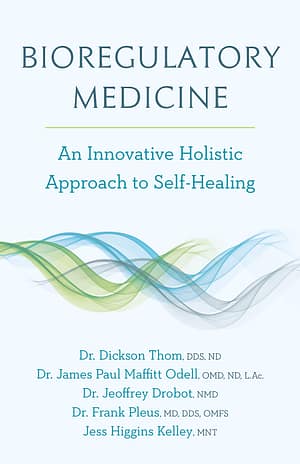What is Bioregulatory Medicine?

Finding out you have a chronic or degenerative illness can be overwhelming and mind-numbing on its own. Add to that already spinning emotional rollercoaster the possible treatment options, and you may find yourself unable to move forward. For those who are looking for alternative methods to traditional treatment plans, Bioregulatory Medicine could provide a solution. Based on thousands of years of refinement, this complex model focuses on your individual needs as a patient and gives you a customized process that’s best for you and your situation.
The following excerpt is from Bioregulatory Medicine, by Dickson Thom, James Paul, Maffitt Odell, Jeoffrey Drobot, Frank Pleus, Jess Higgins Kelley. It has been adapted for the web.
Today, over half of the world’s population is afflicted with some form of chronic or degenerative illness—heart disease, diabetes, dementia—the list is long. Arthritis is now the most common cause of disability, and one in four people struggle with normal activities because of joint pain. Half of all people will be diagnosed with cancer in their lifetime. One in five people have an autoimmune disease. And these are just a few of the diagnosable diseases. Currently, an estimated one in ten people have a rare, undiagnosable, or medically indefinable condition. Passed like a hot potato from specialist to specialist, these tired, frustrated, and debilitated patients often spend years—not to mention significant financial resources—seeking answers, relief, and eventual cure. And the Western, conventional, allopathic, suppress-the-symptoms- with-pharmaceutical-drugs model is rapidly falling out of favor as more patients desire a nontoxic, noninvasive prevention and healing medical model that identifies and addresses the root cause of illness and elicits true healing. Bioregulatory Medicine, authored by five experts in the field of natural health, introduces a model that has been alive and well in Europe for decades. In countries such as Switzerland, Germany, India, China, Canada, and France—all ranking far higher in health care than the United States—bioregulatory medicine is a household term.
Bioregulatory medicine, or BioMed (both terms will be used interchangeably throughout this book), is otherwise known throughout the world as European Biological Medicine, bioregulatory systems medicine, Swiss biological medicine, or biological regulatory medicine. It is a comprehensive, evidence-based, and holistic medical model that has been used and refined for over five thousand years by some of the brightest minds in medicine, science, and philosophy. A total body (and mind) approach to health and healing, the scope of BioMed extends into disease prevention, optimizing performance, and chronic and degenerative illness treatment. Using a sophisticated synthesis of a wide 
What exactly is bioregulation? For starters, the human body is comprised of approximately one hundred thousand billion cells that carry out over one hundred thousand biochemical reactions per second. Humans have dozens of bioregulating systems, including the nervous, endocrine, neurological, cardiovascular, digestive, and many more systems. Every bioregulating system is intimately related on both an electrical basis and a biochemical basis to another. When communication either within or between these systems fails, dysregulation and symptoms will follow. The human body is a wondrously designed, self-regulating system that sustains all life processes, such as heart rate, blood sugar levels, hormone production, respiratory rate, detoxification, immune function, and blood pressure. Processes most of us aren’t even aware are happening. Each of these systems seeks a state of balance, called homeostasis. One example of a system balancing itself is thermoregulation, where if we get too hot, we perspire. Another example is a feedback system called blood sugar regulation, where if our blood glucose gets too high, insulin is released to lower it. And if a toxin enters your system, your immune system reacts to disarm it. Breathing is regulated, blood pressure is regulated, digestion is regulated, circulation is regulated, and on and on. Consider of all the things your body is doing without you even thinking about it!
“Dis-ease” happens when one or more of these systems is pushed out of balance. That said, there is rarely ever a single cause of disease. Modern chronic and degenerative illnesses usually have at least five regulatory systems that are out of balance. This complexity is why there are no—and can be no—“specialists” in bioregulatory medicine: The body is interconnected. As soon as systems are viewed in isolation, we lose the whole. For example, in bioregulatory medicine, a gastroenterologist also needs to be an immunologist, because 80 percent of the immune system is located in the gastrointestinal tract. Our gut microbiota controls our mood. Hormones from the endocrine system affect the function of our digestive system. There is no cell, no system, inside our body that works independently. Because of this holistic, systems-based approach, patients new to BioMed can be surprised when immune symptoms are first approached with treatments for the brain, or skin issues are first addressed in the gastrointestinal tract. BioMed is total body medicine, which is less about treating a specific diagnosis and more about addressing and reversing dysregulation in the body as a whole.
Each bioregulatory system has an innate ability to self-repair or self-heal if injured. Think about it: A cast doesn’t heal a broken arm; the biological process of bone formation called ossification does. A cast only creates one single preferred precondition—static immobilization—for a broken arm to heal. We’ve known about this self-healing ability for a long time. Hippocrates stated during the fifth century BC that the body has the inherent ability—the vitality—not only to heal itself and restore itself to health, but also to ward off disease. But it does this only on the condition that it’s given the right tools to do so. In bioregulatory medicine, disease is not seen as the enemy with which one needs to fight, rather a manifestation of the breakdown of mechanisms that maintain control and homeostasis. Symptoms are simply the body’s way of expressing dysregulation, and the goal is to identify and remove these obstacles to cure.
BioMed is about supporting and restoring the body’s bioregulating systems’ ability to regenerate, repair, and self-heal through the use of natural and energetic therapies. And it’s even more than that, too. BioMed is a multifaceted, multidisciplinary medical model that is patient-, health-, performance-, ecology-, biology-, spiritually, physiology-, and curatively centered. Bioregulatory medicine focuses on individuality, taking into account each person’s unique biochemical, historical, energetic, structural, sociological, and psycho-emotional patterns. There’s only one you, so there can be only one tailored medical approach that will best meet your needs. In this way, bioregulatory medicine offers entirely customized protocols that combine ancient health care wisdom with modern scientific technological advancements. Since there is no health care manual specific to you, there is no one case study that will be similar to your process. Everyone is unique. So while allopathic medicine has strived to become an exact science, working from the platform of “hard data,” just the facts, irrefutable formulas, and proven double-blind studies, bioregulatory medicine simply, artfully, and skillfully centers on the patient.
Recommended Reads
Recent Articles
Want to start your own medicinal herb garden? Passionflower, lemon balm, and goldenseal are great places to begin! These herbs are jam-packed with medicinal properties and easy to grow in a majority of climates.
Read MoreSprouts are easy to cultivate, mature quickly and pack a nutritional punch! You can make nutrient-rich sprouts from all kinds of edible seeds in your kitchen.
Read MoreSuffering from frequent headaches is miserable and immobilizing. If you haven’t had luck treating and preventing your headaches, skip the over-the-counter approach and prepare herbal formuals for migraines to use in the future! The following is an excerpt from Herbal Formularies for Health Professionals, Volume 4 by Jill Stansbury. It has been adapted for the…
Read More“It is more important to know what kind of person has a disease than to know what kind of disease a person has.” —Hippocrates Drawing on her decades of clinical experience and her extensive research, Dr. Jill Stansbury offers an unparalleled range of herbal formulas in her five-volume set, Herbal Formularies for Health Professionals. For each…
Read More








